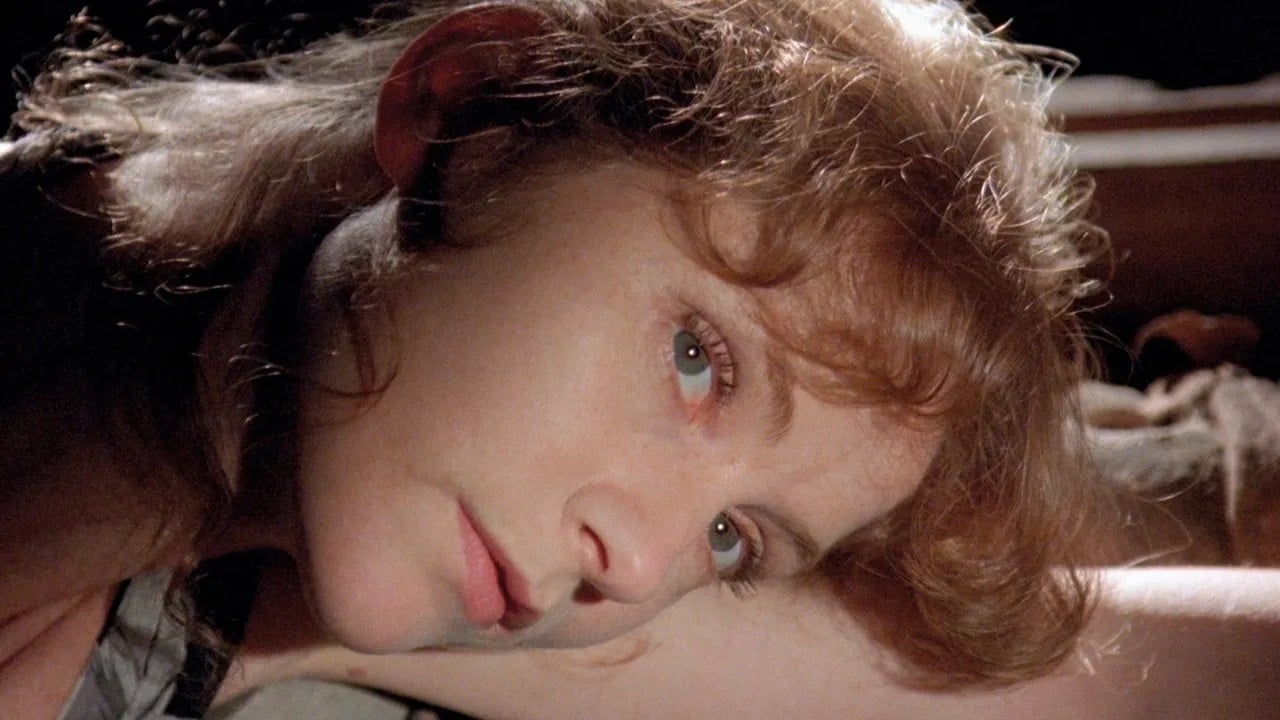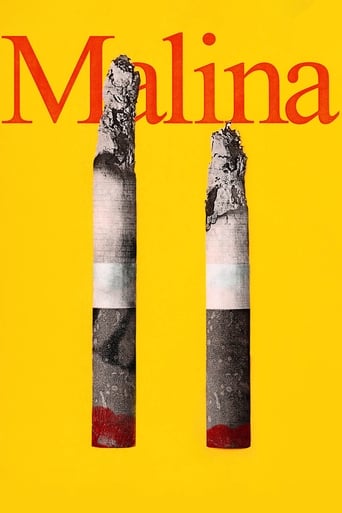Interesteg
What makes it different from others?
Rijndri
Load of rubbish!!
Supelice
Dreadfully Boring
Isbel
A terrific literary drama and character piece that shows how the process of creating art can be seen differently by those doing it and those looking at it from the outside.
Horst in Translation (filmreviews@web.de)
"Malina" is a German/Austrian co-production that resulted in a French/German-language film, but I believe the only French thing here is lead actress Isabelle Huppert and she spoke her parts in her native language and got dubbed by Lisa Kreuzer. This film is from 1991, so it has its 25th anniversary this year. It is possibly the most known work by director Werner Schroeter and the two Austrian writers, Ingeborg Bachmann and Elfriede Jelinek, are somewhat famous today too, at least here in Germany. The film was a huge success at the German Film Awards where it did not only take home the big prize, but also received trophies for directing, lead acting and editing. I cannot share the praise, however. While I occasionally liked Huppert's performance, I felt that overall the story as well as the minor characters were really not even close to being captivating enough for a two-hour film unfortunately. German film fans will see more familiar faces such as Peter Kern or Mathieu Carrière. But they did not sparkle my interest in this film either. Then again, I must say I am a bit biased here as I have seen Schroeter's most known works (5 years after his death) and I was very much underwhelmed by pretty much everything I saw. But I must also say that this one here is entirely different than his work with Montezuma for example and I guess this is also why it is more easily accessible for awards bodies as it received more outside the German Film Awards. But like I said, I cannot share the praise here and this film's success is just another piece of evidence for me that the 1990s started fairly weak for German cinema and the great films of reunited Germany followed years later, not yet so quickly. I give this one a thumbs-down. It dragged on several occasions and Huppert wasn't that good either, just not as bad as the rest about the film. Watch something else instead.
JustApt
Malina is incredibly complex drama on the nature of insanity and to watch it, especially in the beginning, is quite a labour. A woman believes that she is a writer and all her men are fruits of her ill consciousness or personages of her unwritten book or alter egos of her split imagination. And episode after episode her consciousness keeps deteriorating more and more but the end breaks everything once again so all that was happening comes up in absolutely different light and changes its meaning. Malina is an anagram of 'animal' and it isn't accidental but symbolic to the entire surrealistic content of the film. Malina is unique and utterly fabulous movie having many layers of narration and visualization.
semiotechlab-658-95444
In Werner Schroeter's very free interpretation of Ingeborg Bachmann's novel "Malina" (1971), the main character has no name, but appears in four reflections, two of them are the male main characters Malina and Ivan. Moreover, Schroeder used even two light-doubles for a famous mirror scene in which the female character appears in a "chiastic" and thus non-Aristotelian relation. We already see: Schroeder's movie is a movie about the splitting of individuality, but not simply by creating Doppelgängers, as, e.g. R.W. Fassbinder did in the characters of Hermann Hermann and Felix Weber in "Despair" (1978), but so that every time one of the two male reflections and one of the two female reflections stand in an over-cross relation to one another. This had been done before in such a splendid manner only once: by E.T.A. Hoffmann in his "Princess Brambilla" (1820). A comparison of the time of Schroeter and that of Hoffmann is made here not merely by the coincidence of some motives, but by the fact that Schroeter very often uses Pre-Illumination procedures instead of telling a story in the rationalist way. Very often, this happens by the use of mythological movies or specific themes out of operas. We remember the famous Paphnutius episode in which the former fairy Rosabelverde appears as Fräulein Von Rosenschöngrün and the puzzled narrator explains that by order of the ruler all non-rationalist concepts have been banned out of the state. However, we are also told that certain relics of thought have survived, and in the modern time of film we mostly meet them in the fascinating oeuvre of Schroeter where causality appears together with magical series, the subject is subject to a topic taken from association rather than logic and so on. In a certain, no less fascinating, way one could say that Schroeter uses for deconstruction of our reality, based on two-valued logic, not the famous procedures prepared by Derrida and already by Heidegger, but by dissolving rational structures in the streams of Pre-Enlightenment pictures. When the female main character, who doubtlessly bears the signs of writer Ingeborg Bachmann herself, talks about her constant pains and her impossibility to live under the premises of her work and the two men who are her projections, we realize that Bachmann's writing (including her PhD dissertation about fundamental ontology) are interpreted by Schroeter from the standpoint of deconstructing femininity. After having destroyed her femininity up to a certain measure by construction of her different mirror images ("I exist only in the mirror", she says in the movie), she tries to construct it newly by means of what one would call language criticism methodology based on the fundamental ontology of her own work. To see that and how she fails leads in Schroeter's movie to a spectacular last scene - and also in Bachmann's 47-years-old-life in "reality". In reality?
Shane Anderson
+: the last scene where she disappears into the wall is the only redeeming quality of this movie. it's amazingly beautiful.-: I've read the book, the screenplay and now I've approached the film. I see a clear line of delineation in the quality. Malina the book is a masterpiece, Malina the screenplay is more like reading over Jelinek's shoulder as she tries to read and interpret and add her own problems to Bachmann. And then this film? First of all, it's over intellectual to the point where it makes no difference what's going on, what's being shown, what's being said or how these are supposed to relate. There's reference stacked on top of nauseating reference -which can be OK, but here it adds up to nothing. The insertion of the Bachmann myth only makes it seem more like a novelty piece than a film that's really trying to say something. The pace of the film is awful, the messe en scene is uninventive and the performance, to my dismay, is flat. Another problem: she's 'crazy' from the very beginning. We see only one scene where she can hold her own, but that misses the whole point of both the book and the screen play: that the linguistic problem is at the root of the problem. It's hard to explain much more in such a small format, but I had to write this to warn anyone who also loved the book and decided to see the film version out of love. Approach it with curiosity, but don't expect much from this wanna be art film. Oh, and the whole flame thing? It's been done. Nice try trying to use a 'symbol' which expands upon nothing (other than the Bachmann myth).

